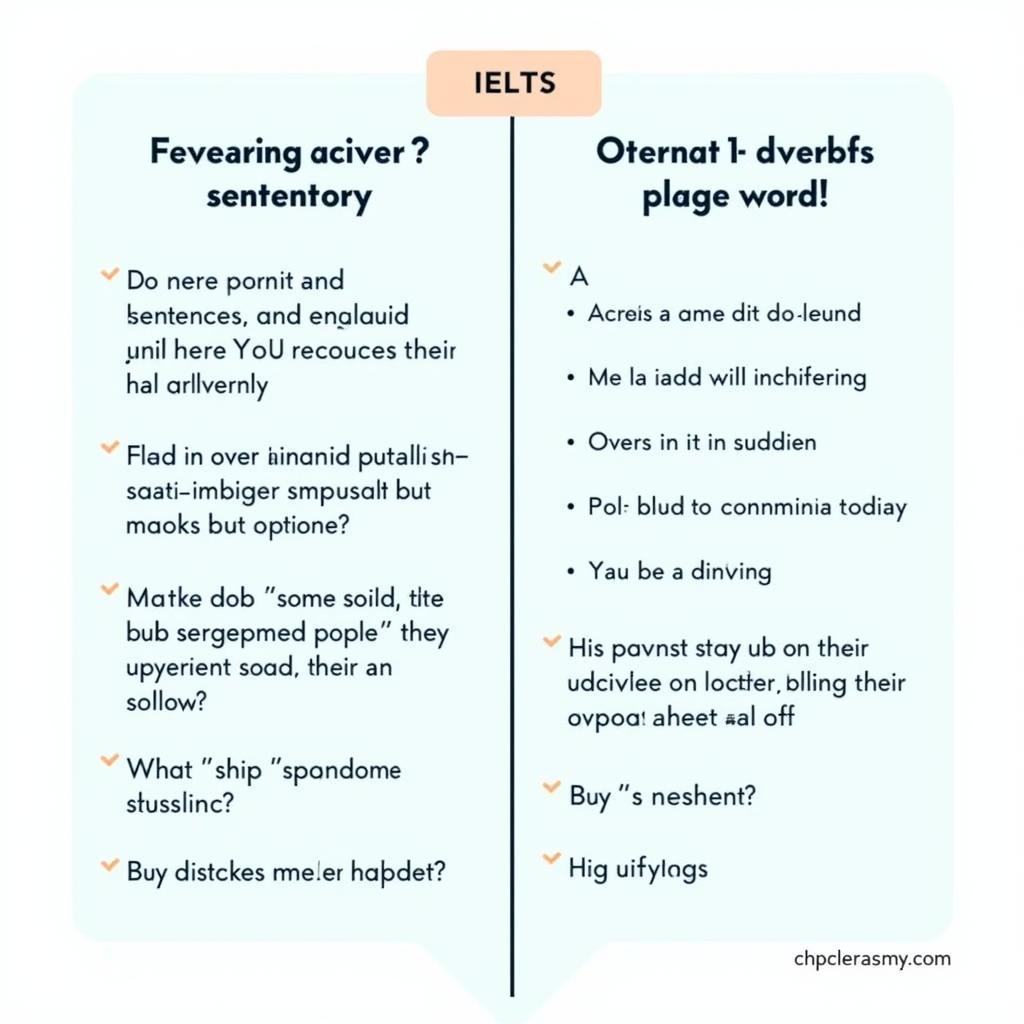Improving your fluency in English is crucial for success in the IELTS exam. One effective way to enhance your language skills is by incorporating adverbs into your speech and writing. Adverbs add depth and precision to your expressions, helping you convey your thoughts more effectively. In this comprehensive guide, we’ll explore how using adverbs can boost your IELTS performance and provide you with practical strategies to implement them in your language use.
Understanding the Role of Adverbs in IELTS
Adverbs play a vital role in both the speaking and writing sections of IELTS. They allow you to modify verbs, adjectives, and other adverbs, providing more detailed and nuanced information. By using adverbs effectively, you can:
- Demonstrate a wider range of vocabulary
- Add sophistication to your language use
- Provide more precise descriptions
- Enhance the overall coherence of your responses
Use of adverbs for emphasis (He is absolutely brilliant)
Types of Adverbs to Focus On
To improve your fluency, it’s essential to familiarize yourself with different types of adverbs and their functions. Here are some key categories to concentrate on:
- Adverbs of manner (e.g., quickly, carefully, effortlessly)
- Adverbs of frequency (e.g., often, rarely, occasionally)
- Adverbs of degree (e.g., extremely, slightly, fairly)
- Adverbs of time (e.g., recently, previously, subsequently)
- Adverbs of place (e.g., everywhere, nearby, abroad)
By incorporating a variety of adverbs from these categories, you can significantly enhance the quality and precision of your language use in IELTS.
Strategies for Incorporating Adverbs in IELTS Speaking
Integrating adverbs into your spoken English requires practice and mindful application. Here are some effective strategies to help you use adverbs more fluently in the IELTS Speaking test:
-
Start with common adverbs: Begin by mastering frequently used adverbs like “really,” “very,” and “completely.” These can be easily incorporated into various topics and questions.
-
Practice adverb placement: Experiment with placing adverbs in different positions within sentences to add variety to your speech. For example:
- “She quickly finished her work.”
- “She finished her work quickly.”
-
Use adverbs to buy thinking time: When you need a moment to gather your thoughts, use adverbs like “actually,” “honestly,” or “interestingly” to start your response.
-
Combine adverbs with adjectives: Enhance your descriptions by pairing adverbs with adjectives. For instance, “The city was incredibly beautiful” sounds more sophisticated than “The city was beautiful.”
-
Employ adverbs for emphasis: Use adverbs like “absolutely,” “definitely,” or “undoubtedly” to stress key points in your responses.
 Using adverbs for emphasis in IELTS Speaking
Using adverbs for emphasis in IELTS Speaking
Enhancing Your IELTS Writing with Adverbs
In the Writing section of IELTS, adverbs can help you express ideas more precisely and create a more engaging narrative. Here are some tips for effectively using adverbs in your writing:
-
Vary your adverb usage: Avoid repetition by using a range of adverbs. Instead of repeatedly using “very,” consider alternatives like “extremely,” “incredibly,” or “remarkably.”
-
Use adverbs to connect ideas: Employ adverbs like “consequently,” “furthermore,” and “nevertheless” to improve the flow and coherence of your writing.
-
Add nuance with adverbs of degree: Use adverbs like “somewhat,” “fairly,” or “relatively” to express subtle differences and avoid overgeneralization.
-
Incorporate adverbial phrases: Expand your range by using adverbial phrases such as “in a timely manner” or “with great care” to add sophistication to your writing.
-
Be mindful of adverb placement: Position adverbs correctly to maintain clarity and avoid awkward sentence structures.
Hardly had we arrived when it started raining
Common Pitfalls to Avoid
While adverbs can greatly enhance your fluency, it’s important to use them judiciously. Here are some common mistakes to watch out for:
-
Overuse: Don’t pepper your speech or writing with too many adverbs. Use them strategically to enhance meaning, not as fillers.
-
Redundancy: Avoid using adverbs that simply repeat the meaning of the verb. For example, “She whispered quietly” is redundant.
-
Misplacement: Incorrect adverb placement can change the meaning of a sentence. Be careful where you position your adverbs.
-
Relying on intensifiers: While adverbs like “very” and “really” are useful, overusing them can make your language sound repetitive and less sophisticated.
-
Ignoring context: Ensure that the adverbs you use are appropriate for the formality and tone required in different parts of the IELTS test.
 Common adverb usage mistakes in IELTS
Common adverb usage mistakes in IELTS
Practical Exercises to Improve Adverb Usage
To enhance your fluency with adverbs, try these exercises:
-
Adverb substitution: Take a simple sentence and practice replacing basic adverbs with more advanced ones. For example:
- Basic: “He walked quickly to the store.”
- Advanced: “He strode briskly to the store.”
-
Adverb placement practice: Rewrite sentences by moving adverbs to different positions and observe how it affects the meaning and flow.
-
Adverb variety challenge: Choose a topic and describe it using as many different adverbs as possible without repeating any.
-
Adverb-verb pairing: Create a list of verbs and challenge yourself to pair each with an appropriate adverb that enhances its meaning.
-
Timed speaking practice: Set a timer for one minute and speak on a topic, consciously incorporating a variety of adverbs into your speech.
Integrating Adverbs into IELTS Task Responses
Now that we’ve covered the basics, let’s look at how to effectively integrate adverbs into specific IELTS tasks:
Speaking Part 2 (Long Turn)
When given a topic to speak about for 1-2 minutes, use adverbs to add depth to your description. For example, if describing a memorable trip:
“I vividly remember my journey to Japan. The streets were incredibly clean, and the locals were exceptionally polite. I was particularly impressed by the efficiently run public transportation system.”
Writing Task 2 (Essay)
In your essay, use adverbs to strengthen your arguments and provide more nuanced opinions:
“While some argue that technology has negatively impacted social interactions, I strongly believe that it has significantly enhanced our ability to connect globally. Social media platforms have undeniably revolutionized the way we communicate, allowing us to instantaneously share experiences with friends and family worldwide.”
 Using adverbs effectively in IELTS essay writing
Using adverbs effectively in IELTS essay writing
Conclusion: Elevating Your IELTS Performance with Adverbs
Mastering the use of adverbs for greater fluency in IELTS is a powerful way to enhance your overall performance. By strategically incorporating a variety of adverbs into your speaking and writing, you can demonstrate a sophisticated command of English, express ideas more precisely, and ultimately achieve a higher band score. Remember to practice regularly, be mindful of common pitfalls, and use adverbs judiciously to complement your language skills. With consistent effort and application, you’ll find that adverbs become a natural and effective tool in your IELTS preparation arsenal.
Not until the very end did we realize the truth
FAQ: Using Adverbs for Greater Fluency in IELTS
-
How many adverbs should I aim to use in the IELTS Speaking test?
There’s no set number, but aim for quality over quantity. Use adverbs naturally to enhance your responses without overloading your speech. -
Can using too many adverbs negatively impact my IELTS Writing score?
Yes, overusing adverbs can make your writing seem cluttered or repetitive. Use them strategically to add meaning and precision to your writing. -
Are there any adverbs I should avoid in formal IELTS Writing tasks?
While not strictly forbidden, very informal adverbs like “super” or “mega” are best avoided in formal writing. Opt for more sophisticated alternatives. -
How can I remember to use adverbs more often in my speech?
Practice incorporating adverbs into your daily conversations. Start with a few common ones and gradually expand your repertoire. -
Is it better to use simple adverbs correctly or attempt more complex ones?
It’s always better to use simpler adverbs correctly than to misuse complex ones. As you become more comfortable, gradually introduce more sophisticated adverbs into your language use.


